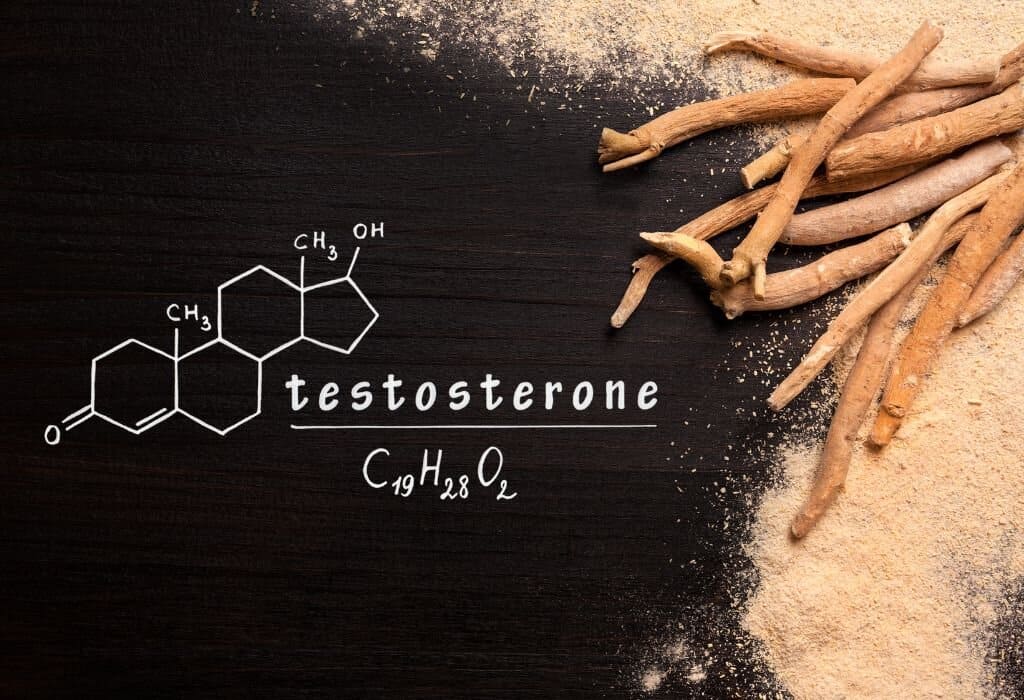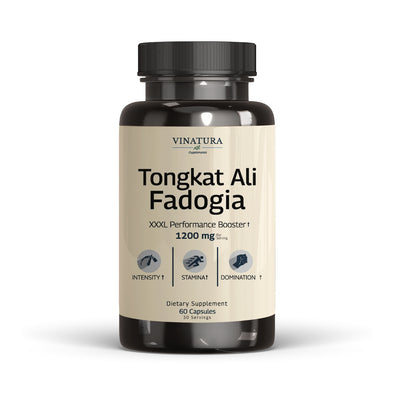
Does Ashwagandha Increase Testosterone?
Nowadays, alongside modern support methods, male reproductive health issues caused by hormonal imbalances and infections can also be addressed using natural herbs, Ashwagandha being one of them.
Ashwagandha (Indian ginseng) has been utilized in Ayurveda medicine for a long time as an herb with numerous health benefits.
One of the most notable and widely discussed benefits of Ashwagandha is its ability to boost testosterone levels.
This article aims to provide information to answer the question: Does Ashwagandha increase testosterone?
Before exploring further, please read the disclaimer located at the end of this webpage.
Key Takeaways
- Ashwagandha has been shown to help boost testosterone in numerous studies.
- The safe dosage to increase testosterone levels is between 300-600 mg and not exceeding 5 g per use.
- Ashwagandha can cause side effects such as dizziness, hallucinations, and increased sexual desire in some users.
Does Ashwagandha Increase Testosterone?
As indicated by several recent studies, Ashwagandha helps increase testosterone levels.
One study evaluating the role of Ashwagandha in supporting male infertility found that consuming Ashwagandha root suppresses lipid peroxidation, improves sperm count and motility, and regulates reproductive hormone levels, particularly by increasing testosterone levels [1].
Another study conducted on 57 young men over two months to test the herbal supplement's capacity to enhance muscle strength and recovery showed significant improvements in muscle size and serum testosterone levels [2].
Thus, Ashwagandha effectively increases testosterone levels in men, addressing reproductive health issues and supporting muscle enhancement. However, further research is needed to solidify this role.
How Does Ashwagandha Impact Testosterone Level? Scientific Evidence

Withanolides are the main active compounds in Ashwagandha, with Withaferin A being the most studied.
This compound has anti-inflammatory properties, protects cells from oxidation, helps the body respond well to stress, and is crucial in enhancing testosterone levels [3]. It achieves its function through the 3 following mechanisms:
Ashwagandha May Reduce Cortisol Levels and Boost Testosterone
Ashwagandha inhibits cortisol (stress hormone) production, as evidenced by its impact on cortisol levels in the adrenal cortex.
A study reviewing sleep quality, memory improvement, and concentration showed that Ashwagandha helps reduce cortisol secretion, providing anti-stress and immune-regulating effects [4].
Another study examining 13 herbs for their effectiveness in mitigating age-related testosterone decline in men also highlighted Ashwagandha's positive impact on boosting this hormone.
Consequently, it helps address related issues such as depression, type 2 diabetes, obesity, and cardiovascular diseases [5].
Ashwagandha Increase Luteinizing Hormone (LH) Production
Ashwagandha boosts luteinizing hormone levels, a chemical that promotes critical processes in the human reproductive system.
Some animal studies have also confirmed the positive impacts of Ashwagandha-based supplements on luteinizing hormone, stimulating follicles, activating testicles, balancing, and increasing testosterone and progesterone levels [6].
Ashwagandha Antioxidant Properties
Oxidative stress is one of the causes that reduce normal testosterone levels, straining the testicles, decreasing sperm count, possibly damaging sperm DNA, and leading to infertility [7].
Withania somnifera compounds in Ashwagandha are noted for their anti-stress properties, significantly contributing to combating stress, increasing testosterone levels, improving antioxidant status, and reducing male infertility [8].
How Much Does Ashwagandha Increase Testosterone?

Ashwagandha shows promising potential in supporting testosterone enhancement.
A study conducted on overweight, frequently fatigued men aged 40-70 over four months demonstrated a 14.7% higher growth in testosterone levels and an 18% increase in DHEA (a hormone that stimulates the production of other hormones) [9].
In addition to increasing testosterone levels, Ashwagandha also raises the chances of pregnancy in partners by 14% in patients facing infertility due to stress [8].
How Long Does It Take For Ashwagandha to Work for Testosterone?
A clinical trial conducted in Florida on 17 men with a 225 mg/day dosage for 30 days showed positive results in reducing anxiety and stress [11].
Another 90-day study on 130 healthy men and women in India with a 300 mg dosage also recorded increased stress levels and sleep quality among participants [12].
Therefore, Ashwagandha takes at least 30 days to effectively enhance testosterone levels, with a more assured period being 60-90 days with consistent and regular use.
How Much Ashwagandha Per Day for Testosterone?
Ashwagandha is used for various purposes, with each effect accompanied by a specific dosage. First, consult a specialist before using any dietary supplements directly affecting health.
For the effect of increasing testosterone, the recommended dosage is 300-600 mg of Ashwagandha daily.
This dosage is safe and can increase testosterone levels with regular long-term use, in combination with a healthy lifestyle and proper diet [10]. Consult a specialist for specific dosages according to individual physiques.
Ashwagandha Safety And Side Effects When Taken for Testosterone In Men

A study by Raut et al. in 2012 applied a dosage of 5 g (equivalent to 5000 mg) to 18 healthy volunteers.
After 30 days of testing, one volunteer showed increased appetite and heightened libido, experienced hallucinations when dizzy, and was removed from the study, while the remaining showed no side effects [13].
The study's experts assessed this dosage to be safe for muscle activity. However, it still poses potential risks such as dizziness, hallucinations, uncontrollable appetite, and increased libido.
Additionally, Ashwagandha belongs to the Solanaceae family [14], so those allergic to tomatoes, eggplants, and peppers should be cautious.
Does Ashwagandha Increase Testosterone In Women?
It is not yet certain whether Ashwagandha increases testosterone levels in women. Consult a doctor or healthcare professional for the most accurate answer.
Some studies suggest that Ashwagandha works in the female body similarly to how it does in men, increasing serum testosterone levels, reducing follicle-stimulating hormone levels, and boosting luteinizing hormone production [15].
Conversely, another study indicated no significant changes in testosterone levels after using 300 mg for eight weeks in 100 pre-menopausal women [16].
Other Benefits of Ashwagandha for Men
Besides increasing testosterone levels, Ashwagandha also performs the following functions effectively for men's health:
- Increasing muscle strength and mass: Ashwagandha is an effective antioxidant that helps prevent muscle damage, enhances recovery, and supports muscle growth [17].
- Improving reproductive function: Ashwagandha has antioxidant properties that reduce stress and prevent the occurrence of free radicals, which can disrupt sperm health and hormone balance [18].
- Boosting libido: Ashwagandha increases testosterone levels and reduces the secretion of the stress hormone cortisol, which helps boost sexual desire [19].
Conclusion
This article has explored the benefits, recommended dosage, and potential side effects to answer the question, "Does Ashwagandha increase testosterone?".
If you are experiencing issues with low testosterone levels, consult your doctor, maintain a healthy diet and lifestyle, and consider using Ashwagandha as a natural support method. However, always monitor and adjust the dosage appropriately.
References
- [1] Sengupta, Pallav, et al. "Role of Withania Somnifera (Ashwagandha) in Managing Male Infertility." Reproductive BioMedicine Online, vol. 36, no. 3, Mar. 2018, pp. 311–326, https://doi.org/10.1016/j.rbmo.2017.11.007. Accessed 13 Oct. 2019.
- [2] Wankhede, Sachin, et al. "Examining the Effect of Withania Somnifera Supplementation on Muscle Strength and Recovery: A Randomized Controlled Trial." Journal of the International Society of Sports Nutrition, vol. 12, no. 1, 2015, p. 43, www.ncbi.nlm.nih.gov/pubmed/26609282, https://doi.org/10.1186/s12970-015-0104-9.
- [3] Prakash, Jai, et al. "Withania Somnifera Root Extract Prevents DMBA-Induced Squamous Cell Carcinoma of Skin in Swiss Albino Mice." Nutrition and Cancer, vol. 42, no. 1, Jan. 2002, pp. 91–97, https://doi.org/10.1207/s15327914nc421_12. Accessed 21 June 2020.
- [4] Gopukumar, Kumarpillai, et al. "Efficacy and Safety of Ashwagandha Root Extract on Cognitive Functions in Healthy, Stressed Adults: A Randomized, Double-Blind, Placebo-Controlled Study." Evidence-Based Complementary and Alternative Medicine, vol. 2021, 30 Nov. 2021, pp. 1–10, https://doi.org/10.1155/2021/8254344.
- [5] Smith, Stephen J, et al. "Examining the Effects of Herbs on Testosterone Concentrations in Men: A Systematic Review." Advances in Nutrition, vol. 12, no. 3, 5 Nov. 2020, https://doi.org/10.1093/advances/nmaa134.
- [6] Rahmati, Batool, et al. "Effect of Withania Somnifera (L.) Dunal on Sex Hormone and Gonadotropin Levels in Addicted Male Rats." PubMed, vol. 10, no. 2, 22 July 2016, pp. 239–44, www.ncbi.nlm.nih.gov/pmc/articles/PMC4948077/, https://doi.org/10.22074/ijfs.2016.4915. Accessed 7 Mar. 2024.
- [7] Asadi, Nematollah. "The Impact of Oxidative Stress on Testicular Function and the Role of Antioxidants in Improving It: A Review." JOURNAL of CLINICAL and DIAGNOSTIC RESEARCH, 2017, https://doi.org/10.7860/jcdr/2017/23927.9886.
- [8] Mahdi, Abbas Ali, et al. "Withania SomniferaImproves Semen Quality in Stress-Related Male Fertility." Evidence-Based Complementary and Alternative Medicine, vol. 2011, 2011, pp. 1–9, https://doi.org/10.1093/ecam/nep138.
- [9] Lopresti, Adrian L., et al. "A Randomized, Double-Blind, Placebo-Controlled, Crossover Study Examining the Hormonal and Vitality Effects of Ashwagandha (Withania Somnifera) in Aging, Overweight Males." American Journal of Men's Health, vol. 13, no. 2, Mar. 2019, p. 155798831983598, https://doi.org/10.1177/1557988319835985.
- [10] "Office of Dietary Supplements - Ashwagandha: Is It Helpful for Stress, Anxiety, or Sleep?" Ods.od.nih.gov, ods.od.nih.gov/factsheets/Ashwagandha-HealthProfessional/#:~:text=In%20several%20studies%2C%20benefits%20appeared.
- [11] Remenapp, A., et al. "Efficacy of Withania Somnifera Supplementation on Adult's Cognition and Mood." Journal of Ayurveda and Integrative Medicine, vol. 13, no. 2, Apr. 2022, p. 100510, https://doi.org/10.1016/j.jaim.2021.08.003.
- [12] Deshpande, Abhijit, et al. "A Randomized, Double-Blind, Placebo-Controlled Study to Evaluate the Effects of Ashwagandha (Withania Somnifera) Extract on Sleep Quality in Healthy Adults." Sleep Medicine, vol. 72, Mar. 2020, https://doi.org/10.1016/j.sleep.2020.03.012.
- [13] Raut, Ashwinikumar A, et al. "Exploratory Study to Evaluate Tolerability, Safety, and Activity of Ashwagandha (Withania Somnifera) in Healthy Volunteers." Journal of Ayurveda and Integrative Medicine, vol. 3, no. 3, 2012, pp. 111–4, www.ncbi.nlm.nih.gov/pubmed/23125505, https://doi.org/10.4103/0975-9476.100168.
- [14] "Uses of Withania Somnifera (Linn) Dunal (Ashwagandha) in Ayurveda and Its Pharmacological Evidences." Research Journal of Pharmacology and Pharmacodynamics, vol. 8, no. 1, 2016, www.indianjournals.com/ijor.aspx?target=ijor:rjppd&volume=8&issue=1&article=006.
- [15] Dongre, Swati, et al. "Efficacy and Safety of Ashwagandha (Withania Somnifera) Root Extract in Improving Sexual Function in Women: A Pilot Study." BioMed Research International, 4 Oct. 2015, www.hindawi.com/journals/bmri/2015/284154/.
- [16] Gopal, Sriram, et al. "Effect of an Ashwagandha ( Withania Somnifera ) Root Extract on Climacteric Symptoms in Women during Perimenopause: A Randomized, Double‐Blind , Placebo‐Controlled Study." Journal of Obstetrics and Gynaecology Research, 22 Sept. 2021, https://doi.org/10.1111/jog.15030. Accessed 20 Nov. 2021.
- [17] Bonilla, Diego A., et al. "Effects of Ashwagandha (Withania Somnifera) on Physical Performance: Systematic Review and Bayesian Meta-Analysis." Journal of Functional Morphology and Kinesiology, vol. 6, no. 1, 11 Feb. 2021, p. 20, https://doi.org/10.3390/jfmk6010020.
- [18] ---. "Role of Withania Somnifera (Ashwagandha) in the Management of Male Infertility." Reproductive BioMedicine Online, vol. 36, no. 3, Mar. 2018, pp. 311–326, https://doi.org/10.1016/j.rbmo.2017.11.007.
- [19] Rodríguez-Nieto, Geraldine. "The Modulatory Role of Cortisol in the Regulation of Sexual Behavior in Young Males." Frontiersin, 2020, www.frontiersin.org/articles/10.3389/fnbeh.2020.552567/full. Accessed 21 May 2024.
Author

Product Disclaimer
The dietary supplement products mentioned on this website are formulated based on scientific research and adhere to FDA guidelines for dietary supplements. However, the content of the articles has not been evaluated by the Food and Drug Administration (FDA) and is not intended to promote or endorse any specific product. Any products sold on this website are not intended to diagnose, treat, cure, or prevent any disease.
Opinions and Endorsements
Any claims, statements, or opinions expressed in the articles are those of the author(s) and do not necessarily reflect the views or opinions of the manufacturers of the dietary supplement products. The products sold on this website are separate from the content of the articles and are not directly endorsed or associated with the information presented here.
Liability Disclaimer
The author(s) of the articles, website, and manufacturers of the dietary supplement products do not assume any liability for any potential consequences arising from the use of the information provided in the articles. It is recommended that individuals consult with a qualified healthcare professional before making any dietary or lifestyle changes, including the use of dietary supplements.
Product Usage
Please refer to the product labels and packaging for specific usage instructions and guidelines for the dietary supplement products sold on this website.
Customer Support
For any concerns or questions regarding the dietary supplement products, please contact our customer support team, who will be more than happy to assist you.





Leave a Comment
Be the first to comment.
What do you think?